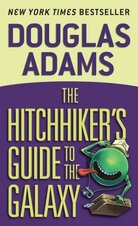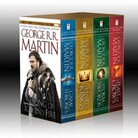The stigma of "geekiness" or "dorkdom" that seems attached to the genre is fading and the 28-year-old football fan who secretly enjoys Robert Jordan doesn't flush so red when sharing that morsel of information.
I'm loving this new-found confidence, and the fact that NPR released the top 100 audience picks for their favorite science fiction and fantasy novels just buttresses the notion that things are changing. It's not to say that lists like this don't already exist from popular websites/magazines/newspapers/etc, but it's nice to see it front and center like this. (The New York Times actually wrote an interesting piece recently on the topic too.)
That said, let's see what NPR found out:
More than 5,000 of you nominated. More than 60,000 of you voted. And now the results are in. The winners of NPR's Top 100 Science-Fiction and Fantasy survey are an intriguing mix of classic and contemporary titles. Over on NPR's pop culture blog, Monkey See, you can find one fan's thoughts on how the list shaped up, get our experts' take, and have the chance to share your own.
A quick word about what's here, and what's not: Our panel of experts reviewed hundreds of the most popular nominations and tossed out those that didn't fit the survey's criteria (after — we assure you — much passionate, thoughtful, gleefully nerdy discussion). You'll notice there are no young adult or horror books on this list, but sit tight, dear reader, we're saving those genres for summers yet to come.
So, at last, here are your favorite science-fiction and fantasy novels. (And a printable version, to take with you to the bookstore.)
Tolkien's seminal three-volume epic chronicles the War of the Ring, in which Frodo the hobbit and his companions set out to destroy the evil Ring of Power and restore peace to Middle-earth. The beloved trilogy still casts a long shadow, having established some of the most familiar and enduring tropes in fantasy literature.
3. Ender's Game by Orson Scott CardIn the first, hilarious volume of Adams' Hitchhiker's series, reluctant galactic traveler Arthur Dent gets swept up in some literally Earth-shattering events involving aliens, sperm whales, a depressed robot, mice who are more than they seem, and some really, really bad poetry.
Young Andrew "Ender" Wiggin, bred to be a genius, is drafted to Battle School where he trains to lead the century-long fight against the alien Buggers.4. The Dune Chronicles by Frank Herbert
Follows the adventures of Paul Atreides, the son of a betrayed duke given up for dead on a treacherous desert planet and adopted by its fierce, nomadic people, who help him unravel his most unexpected destiny.
5. A Song Of Ice And Fire Series by George R.R. MartinAs the Seven Kingdoms face a generation-long winter, the royal Stark family confronts the poisonous plots of the rival Lannisters, the emergence of the Neverborn demons, the arrival of barbarian hordes, and other threats.
[...]
10. American Gods by Neil Gaiman
On the plane home to attend the funerals of his wife and best friend, Shadow, an ex-con, encounters an enigmatic stranger who seems to know a lot about him. When Shadow accepts the stranger's job offer, he finds himself plunged into a perilous game with the highest of stakes: the soul of America itself.
This tale of a handsome farm boy who, aided by a drunken swordsman and a gentle giant, rescues a beautiful princess named Buttercup comes with a slyly humorous, metafictional edge: Goldman claims to have merely abridged an earlier text by one "S. Morgenstern" (actually a pseudonym) and peppers his text with clever commentary.
12. The Wheel Of Time Series by Robert Jordan
At 13 volumes and counting, this sweeping — some would say sprawling – richly imagined epic chronicles the struggle between servants of the Dark One and those of the champion of light known as the Dragon Reborn.
Farm animals overthrow their human owners and set up their own deeply (and familiarly) flawed government. Orwell's mordant satire of totalitarianism is still a mainstay of ninth-grade reading lists.
14. Neuromancer by William Gibson
Gibson's groundbreaking debut novel follows Case, a burned-out computer whiz, who is asked to steal a security code that is locked in the most heavily guarded databank in the solar system. A seminal work in the genre that would come to be known as cyberpunk.
[...]
16. I, Robot by Isaac AsimovIsaac Asimov changed our perception of robots forever when he formulated the laws governing their behavior. In I, Robot, Asimov chronicles the development of the robot through a series of interlinked stories: from its primitive origins in the present to its ultimate perfection in the not-so-distant future — a future in which humanity itself may be rendered obsolete.
Check out the complete list HERE
Other authors on the list? Robert A. Heinlein, Anne McCaffery, Patrick Rothfuss, Ray Bradbury, Neal Stephenson, Roger Zelazny, and Brandon Sanderson.
What is YOUR favorite science fiction/fantasy novel??




What a great list! It includes some authors I love (Terry Pratchett, Lois McMaster Bujold, Susanna Clarke, Jasper Ffords, Neil Gaiman, Jim Butcher, Robin Mckinley, Isaac Asimov & C. S. Lewis) but not my favorite: Diana Wynn Jones.
ReplyDelete